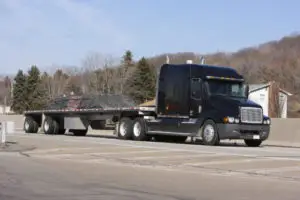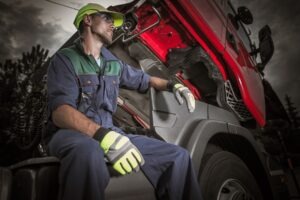
Flatbed trucks serve a vital purpose in transporting many items across the United States every day. Flatbed trucks help carry heavy loads that usually do not fit on traditional trucks, like construction equipment, sheds, even parts of houses. Unfortunately, the cargo carried by flatbed trucks can also increase the risk that those trucks and their drivers will cause serious accidents. Read on to learn more about the concerns and hazards of flatbed trucks from our Fort Myers truck accident lawyers.
What Causes Flatbed Truck Accidents?
Flatbed trucks, like other big trucks, have disadvantages that can quickly lead to accidents. In addition, flatbed trucks have some unique attributes that can increase the danger you face when sharing the road with one.
Falling Cargo Accidents
On a flatbed truck, loaders and operators typically secure cargo with straps. Flatbed trucks have only a flatbed to support the cargo, with just straps to hold it in place. If one of those straps breaks or the cargo was loaded improperly, heavy items can fall from the flatbed truck, resulting in an accident. When heavy cargo, like construction equipment, falls off the back of the flatbed truck, it can lead to substantial injury for other drivers on the road. Smaller cargo can also fall off of the back of the truck, causing drivers to have to swerve out of the way, slamming into the front of vehicles behind the flatbed, or increasing the risk of tire blowouts for other vehicles on the road.
Accidents Due to Overhanging Cargo
When cargo hangs over the edge of a truck’s bed more than four inches on the sides or four feet in the back, truck drivers must use triangular flags to indicate the extended size of the load and help notify drivers of the location of the load, which drivers may struggle to discern as they approach. Flatbed trucks carrying wide loads must also have special wide load signs indicating that the truck’s load extends outside the parameters of the lane the truck travels in. Flatbeds with wide loads may also have escort vehicles that help prevent other passenger vehicles from getting in the way of the truck. Despite these precautions, overhanging cargo, especially if it shifts, can still cause accidents. In some cases, cargo that hangs over the side of the truck can increase the risk of a sideswipe accident.
Blind Spot Accidents
When unloaded, flatbed trucks have smaller blind spots than other big trucks, since the bed does not prevent the driver from seeing using their mirrors or looking out the back of the truck. But when the bed carries a heavy load, visibility depends on the load on the truck. Entering a loaded flatbed truck’s blind spot can substantially increase accident risk, since the truck driver may have no idea you are there. Blind spot accidents can include right-turn accidents and sideswipe collisions.
Mechanical Failures
Like other big trucks, flatbed trucks require a large number of parts to keep the truck running smoothly. Any type of mechanical failure, from a tire blowout to windshield wiper failure in bad weather, can substantially increase the driver’s risk of becoming involved in an accident.
Jackknife Accidents
Like falling cargo accidents, jackknife accidents often occur due to improperly secured cargo. As the cargo shifts during a turn or abrupt stop, the trailer may swing forward, causing it to move separately from the body of the truck. The heavy loads flatbeds often carry can contribute substantially to this momentum, making it difficult or impossible for the driver to get the trailer back under control. When the trailer swings out of control, it can take the rest of the truck with it, leading to rollovers or crashes.
Driver Error
Truck drivers are legally allowed to spend up to eleven hours on the road every day during a fourteen-hour shift. With all those hours on the road, truck drivers can easily become inattentive, struggling to pay proper attention to every detail on the road around them. Other truck drivers may become distracted by text messages, talking on the phone, or eating and drinking in the truck.
Not only that, many truck drivers may choose to ignore traffic laws and regulations to attempt to meet their deadlines and goals. Since many truck drivers get paid by the mile, they may push speed or try to not to come to complete stops, increasing the miles they travel over a shorter period of time. Unfortunately, these measures may not actually increase the truck driver’s speed at the end of the shift, but they can substantially increase the risk of an accident.
In addition to other safety checks and paying attention to the road, flatbed truck drivers should pull over periodically to check on their cargo and ensure that it remains firmly in place, with tight straps that prevent movement or the risk of rolling. Some drivers, however, skip these safety checks or fail to note important details that indicate the cargo could move, especially if they have spent too many hours on the road.
Expect More, Receive More: Legal Support That Feels Like Family
Sharing the Road With Flatbed Trucks
When sharing the road with commercial trucks, you should pay attention to many of the same details as when you are sharing the road with any large truck: avoiding the truck’s blind spots; leaving plenty of room for the truck, especially in bad weather; and noting signs that the truck plans to change lanes or needs to turn. But when you are sharing the road with a flatbed truck, you may want to exercise a few extra precautions, including:
Keep an eye on the cargo.
If you notice cargo wobbling on the back of a flatbed truck, you may wonder if the driver properly secured that cargo before heading out on the road. If you suspect the cargo may fall, make sure you maintain plenty of distance from the truck. Pull off the road and allow the truck to pass safely if you suspect that the cargo may fall. You may also want to attempt to notify the truck driver if you notice cargo wobbling dangerously or starting to fall. Do not put yourself in danger to get the driver’s attention. If needed, pull off the road and notify the police, who can pull the driver over more safely.
Avoid driving between the truck and a steep incline or drop.
Heavy, unbalanced cargo on the back of a flatbed truck can substantially increase the risk of a rollover accident. If you notice a flatbed truck carrying unbalanced cargo near a steep drop, try to keep your car behind the truck, rather than getting between the flatbed truck and the steep incline. This can help prevent you from ending up underneath the cargo in a rollover accident.
Do not get between a flatbed truck and its escort vehicles.
Many flatbed trucks carrying wide loads or particularly heavy cargo will have escort vehicles. Those escort vehicles may ride at the front and rear of the truck to help keep the road clear for the driver—especially if the flatbed carries a wide load that requires both lanes for the truck to transport it safely. Many drivers will try to swerve around escort vehicles to get past the truck, feeling that they can safely navigate the small space left in the lane. Escort vehicles, however, are there to provide for the safety of the truck, its cargo, and other drivers. If you notice escort vehicles around a truck with a wide load, do not drive around them or attempt to pass them. Instead, wait for the truck to pass safely. Even if you think it may slow down your journey, ultimately, waiting for the truck to pass safely can prevent accidents.
How Do You Determine Liability in a Flatbed Truck Accident?
At the scene of the accident, police officers will assess the conditions that led to the accident and collect evidence, including photos of the accident scene, statements from witnesses, and statements from you and the truck driver. The police officer will then write a report that can serve as a vital piece of evidence in a truck accident claim. If you suffer serious injuries, however, you may not want to file a personal injury claim against the truck driver alone. Many factors can contribute to truck accidents, pointing to more than one responsible party. You deserve the maximum compensation for your injuries, so talk with a lawyer to determine who might bear liability for your injuries after a truck accident. Responsible parties may include:
The Truck Driver
Much of the responsibility for what happens on the road rests on the truck driver. The driver chooses whether to continue pushing forward in bad weather conditions or to stop, and the driver makes the decisions on the road itself, from choosing how fast to take a turn to deciding how much attention to pay to what is happening on the road around them. As a result, the truck driver usually bears some or all of the liability in an accident involving a flatbed truck. The truck driver also bears responsibility for checking on their load and ensuring that the straps continue to hold the cargo safely in place. This is particularly critical if the truck hauls logs, steel beams, or top-heavy, unbalanced construction equipment.
The Trucking Company
The trucking company has a great deal of control over what happens with the vehicles in its fleet. The trucking company decides how often the trucks receive maintenance, when vital repairs and maintenance is taken care of, and when a truck gets taken off the road for potential mechanical failures or problems. The trucking company also establishes important policies, including when a driver should stop driving in bad weather conditions, how long that company’s drivers should operate their trucks each day, and when a driver should avoid getting on the road due to illness, inebriation, or medication use. A trucking company may also share liability for an accident if the company continues to employ a driver who has caused accidents in the past or has a known history of driving while intoxicated.
In addition, the trucking company often decides what truck gets sent to pick up a particular load. While flatbed trucks can handle larger, more unwieldy loads than semi trucks, which must adhere to the limitations of the trailers they pull, that does not necessarily make a flatbed the right choice for hauling some types of equipment or loads that can easily fall from the back of the truck. If the trucking company sends the wrong size flatbed or sends a flatbed to haul a load better carried by another type of truck, the trucking company may share liability in falling cargo accidents or other accidents caused by the cargo.
The Company That Loaded the Cargo
Sometimes, the companies that own the cargo hire the trucks to haul the cargo, but that company’s loaders make sure that the cargo is secured. Unfortunately, in some cases, the loaders may not know how to secure the cargo properly. In other cases, the company may use old, worn straps or straps that do not properly hold the cargo in place. While a truck driver should check the straps to ensure that the company fastened the cargo safely, and the truck driver may need to make checks periodically as they travel, the company that loaded the cargo may also share liability if that cargo falls from the flatbed, causing an accident.
Truck or Parts Manufacturers
Both the manufacturers of the truck and its parts and the manufacturer of the straps that hold cargo in place bear a duty of care to everyone who shares the road with those trucks. If parts fail, causing an accident, the manufacturer may bear some of the liability for the accident, especially if the truck driver used those parts according to the manufacturer’s specifications.
If you suffer injuries in a flatbed truck accident, you may need a Fort Myers personal injury attorney to help you seek the compensation you deserve for your injuries. Contact a Fort Myers attorney as soon as possible after your accident to learn more about the compensation you deserve and to start preparing your claim.






